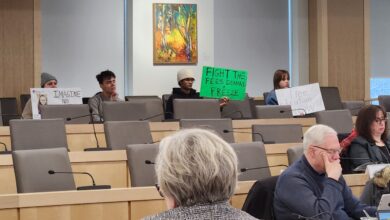 Energeticcity / Twitter
Energeticcity / TwitterActs of civil disobedience, like protests, are widely regarded as tools for effecting positive societal change. However, there are serious issues concerning propriety when the person who committed it is both a politician and a lawyer.
On March 23, 2018, Green Party leader Elizabeth May was arrested for violation of a court injunction. This court order is meant to prevent pipeline protesters from protesting within five metres of a Trans Mountain pipeline construction site. Elizabeth May deliberately disobeyed this court injunction, along with dozens of other demonstrators. Alongside May, at least 100 people have been taken into custody for being in contempt of the injunction. May protested to voice her concerns about the pipeline being an affront to Indigenous rights and environmental protection. She argued that the law can be broken sometimes if it leads to “greater societal change.”
While civil disobedience may indeed be valuable in effecting positive societal change, like in the case of Dr. Martin Luther King Jr. during the American civil rights movement, May’s civil disobedience is particularly unacceptable. Unlike King, she is the leader of a federal political party, which means she took a formal oath of allegiance to our democratic institutions, including the judiciary, which “represent[s] egalitarian governance and the rule of law.” Additionally, she’s also a lawyer, which means she took an oath to respect the authority of the judiciary and champion the rule of law. Through her protest, May has failed to live up to the solemn oaths and high ethical standards expected of her — being a party leader, an MP, and a lawyer in a country that’s well-known for upholding the rule of law. BC Supreme Court Justice Kenneth Affleck echoes this view. As he said in his ruling against May, “no one can pick and choose the law because they believe they have a higher obligation.”
But what about Mahatma Gandhi, a well-known activist who is seen by many in a positive light for his acts of civil disobedience? Some might argue it’s a double standard to see May’s act of civil disobedience as unbecoming of both a lawyer and a politician, while Gandhi, who was also a lawyer and politician, is generally admired and praised. This is flawed for two fundamental reasons: first, unlike May, most of Gandhi’s acts of civil disobedience occurred when his country was not yet independent or democratic. Therefore, we can’t put him up to the same standard expected of May to bear absolute allegiance to the rule of law and the authority of governmental institutions. Second, Gandhi had no legal alternatives wherein he could have his voice heard. On the contrary, May had a legal alternative to voice her indignations: she could have protested with as many people as she wanted, provided she didn’t enter the designated protest-free zones.
The hefty fine to Elizabeth May for her civil disobedience isn’t just about her contempt of court. It’s also about her willful failure to live up to the high ethical standards expected of party leaders and lawyers in this country — a country the world sees as a beacon of respect regarding democratic institutions and the rule of law.




